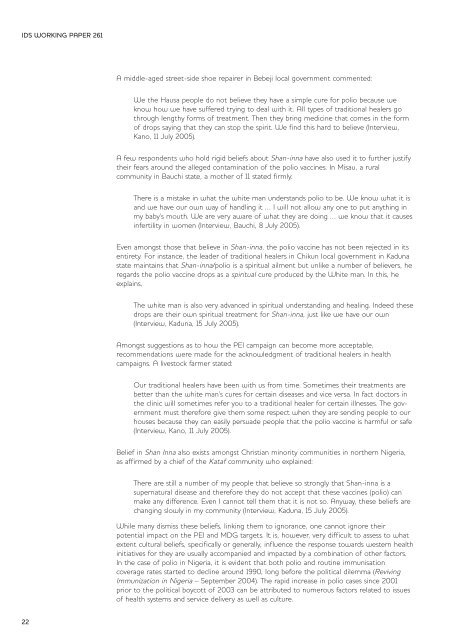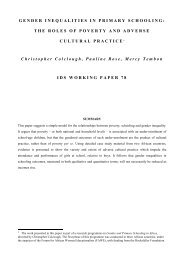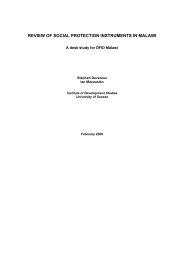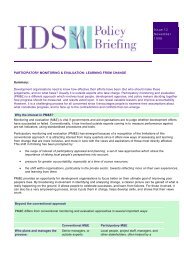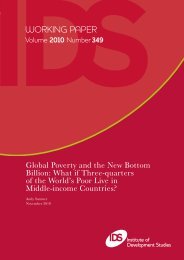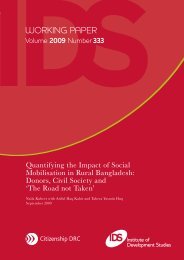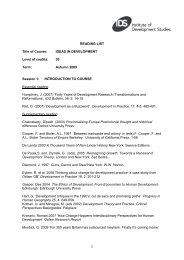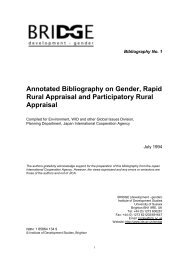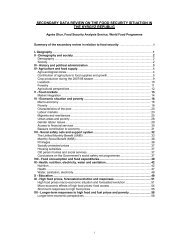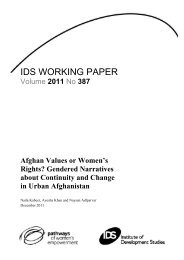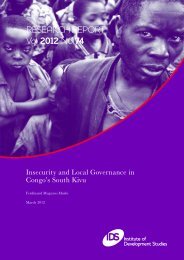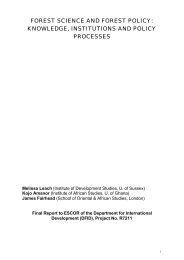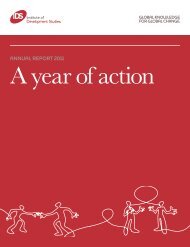WORKING PAPER 261 - Institute of Development Studies
WORKING PAPER 261 - Institute of Development Studies
WORKING PAPER 261 - Institute of Development Studies
Create successful ePaper yourself
Turn your PDF publications into a flip-book with our unique Google optimized e-Paper software.
IDS <strong>WORKING</strong> <strong>PAPER</strong> <strong>261</strong><br />
A middle-aged street-side shoe repairer in Bebeji local government commented:<br />
We the Hausa people do not believe they have a simple cure for polio because we<br />
know how we have suffered trying to deal with it. All types <strong>of</strong> traditional healers go<br />
through lengthy forms <strong>of</strong> treatment. Then they bring medicine that comes in the form<br />
<strong>of</strong> drops saying that they can stop the spirit. We find this hard to believe (Interview,<br />
Kano, 11 July 2005).<br />
A few respondents who hold rigid beliefs about Shan-inna have also used it to further justify<br />
their fears around the alleged contamination <strong>of</strong> the polio vaccines. In Misau, a rural<br />
community in Bauchi state, a mother <strong>of</strong> 11 stated firmly:<br />
There is a mistake in what the white man understands polio to be. We know what it is<br />
and we have our own way <strong>of</strong> handling it … I will not allow any one to put anything in<br />
my baby’s mouth. We are very aware <strong>of</strong> what they are doing … we know that it causes<br />
infertility in women (Interview, Bauchi, 8 July 2005).<br />
Even amongst those that believe in Shan-inna, the polio vaccine has not been rejected in its<br />
entirety. For instance, the leader <strong>of</strong> traditional healers in Chikun local government in Kaduna<br />
state maintains that Shan-inna/polio is a spiritual ailment but unlike a number <strong>of</strong> believers, he<br />
regards the polio vaccine drops as a spiritual cure produced by the White man. In this, he<br />
explains,<br />
The white man is also very advanced in spiritual understanding and healing. Indeed these<br />
drops are their own spiritual treatment for Shan-inna, just like we have our own<br />
(Interview, Kaduna, 15 July 2005).<br />
Amongst suggestions as to how the PEI campaign can become more acceptable,<br />
recommendations were made for the acknowledgment <strong>of</strong> traditional healers in health<br />
campaigns. A livestock farmer stated:<br />
Our traditional healers have been with us from time. Sometimes their treatments are<br />
better than the white man’s cures for certain diseases and vice versa. In fact doctors in<br />
the clinic will sometimes refer you to a traditional healer for certain illnesses. The government<br />
must therefore give them some respect when they are sending people to our<br />
houses because they can easily persuade people that the polio vaccine is harmful or safe<br />
(Interview, Kano, 11 July 2005).<br />
Belief in Shan Inna also exists amongst Christian minority communities in northern Nigeria,<br />
as affirmed by a chief <strong>of</strong> the Kataf community who explained:<br />
There are still a number <strong>of</strong> my people that believe so strongly that Shan-inna is a<br />
supernatural disease and therefore they do not accept that these vaccines (polio) can<br />
make any difference. Even I cannot tell them that it is not so. Anyway, these beliefs are<br />
changing slowly in my community (Interview, Kaduna, 15 July 2005).<br />
While many dismiss these beliefs, linking them to ignorance, one cannot ignore their<br />
potential impact on the PEI and MDG targets. It is, however, very difficult to assess to what<br />
extent cultural beliefs, specifically or generally, influence the response towards western health<br />
initiatives for they are usually accompanied and impacted by a combination <strong>of</strong> other factors.<br />
In the case <strong>of</strong> polio in Nigeria, it is evident that both polio and routine immunisation<br />
coverage rates started to decline around 1990, long before the political dilemma (Reviving<br />
Immunization in Nigeria – September 2004). The rapid increase in polio cases since 2001<br />
prior to the political boycott <strong>of</strong> 2003 can be attributed to numerous factors related to issues<br />
<strong>of</strong> health systems and service delivery as well as culture.<br />
22


